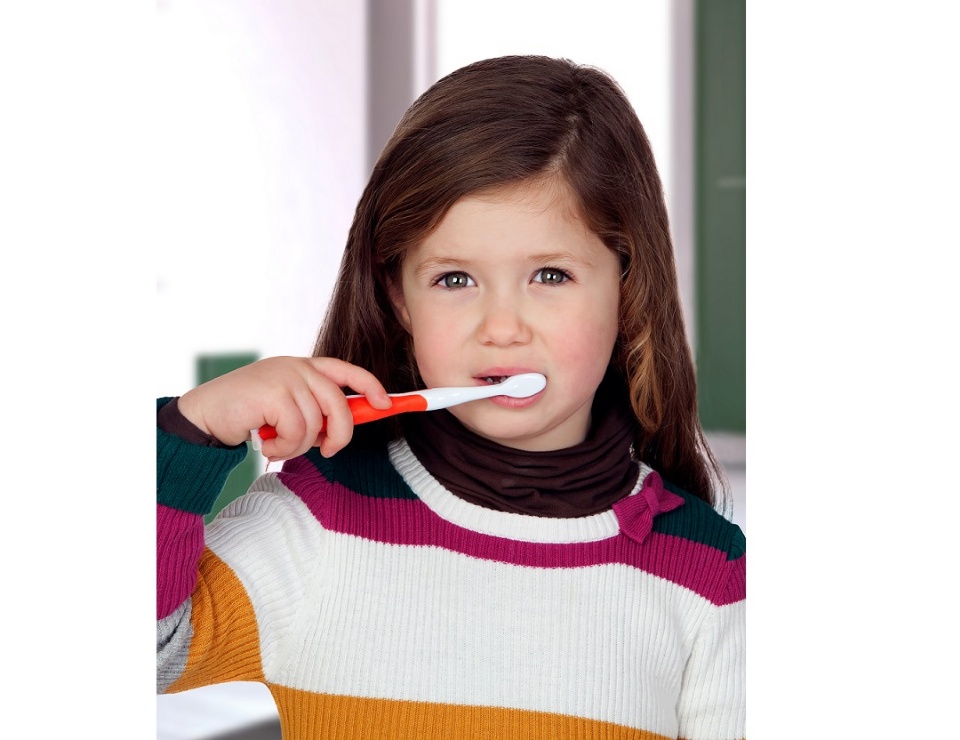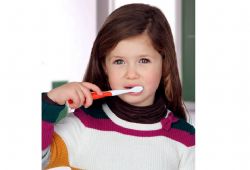With so many varying opinions on how to
care for our babies’ and toddlers’ teeth, it can be exasperating. Why care for
a baby’s gums? Fluoride or no fluoride? When should we start flossing? Here are
some guidelines to finally take some of the pressure off!
According to the Ordre des dentists de Québec, it is important to begin cleaning an
infant’s mouth as early as possible, since this not only gets them used to the
process, but also keeps their mouth relatively clean. To do this, you should
wipe your baby’s gums and tongue with a clean, damp cloth.
Once you begin
feeding your baby cereal and purées, you can continue washing with the cloth up
until he or she grows at least four teeth. Then, you can use a small,
soft-bristle toothbrush and water to gently brush the teeth, gums, and
tongue—before bed is the most important. In addition to the brushing, flossing
should begin once the primary teeth make contact.
“Using
toothpaste freshens our mouths more than anything, but does not prevent the
formation of cavities. What really prevents cavities is flossing. So, brush
their teeth twice a day with water and floss once everyday,” explains Dr.
Raluca Bota of the DentisteALaval
Dental Clinic.
According to Dr.
Bota, the use of fluoride toothpaste should only be introduced once you can be
sure that your child will not swallow any of the paste. “Around the age of
about two and a half to three, children usually learn to spit, so if they are
not swallowing the toothpaste, you can start brushing with a fluoride paste.
However, if they are swallowing it, it is difficult to determine how much
fluoride they are ingesting, so it is better to only use water.”
With all this
information on the cleanliness of teeth, you might also be wondering about the
effects of bottles, sippy cups, pacifiers, and straws. Fill bottles and sippy
cups with good things like milk and water, as juice is not recommended on a
regular basis. Also, try to keep feedings as short as possible. “Prolonged
feedings of over 30 minutes can mean prolonged contact with the teeth, and it
therefore means increased risk of cavities. Also, make sure you always brush
the teeth after a feeding and never let your baby go to sleep with a bottle
since it increases the risk of cavities,” says Dr. Bota.
Pacifiers can
sometimes be the only thing that will soothe a baby, so no need to feel guilty
about using them any longer. Prolonged use of pacifiers can cause orthodontic
problems in the adult teeth, but if their use is stopped at the age of three,
the risk of causing orthodontic problems is decreased, and there is no evidence
the use of straws affect either primary or adult teeth.
Now that the rules are clearly outlined and the
benefits of starting good habits are explained, we can all start brushing with
confidence—and buying curly straws!

 In The Latest Issue:Latest Issue:
In The Latest Issue:Latest Issue:
- A Bittersweet Farewell
- The new Laval Aquatic Co...
- The End of an Era:
Articles
Calendar
Virtual- ANNUAL TEACHER APPRECIATION CONTEST
- APPUI LAVAL
- ARTS & CULTURE
- CAMPS
- CAR GUIDE
- CCIL
- CENTENNIAL ACADEMY
- CHARITY FUNDRAISING
- CITYTV
- COSMODÔME
- COMMUNITY CONNECTIONS
- COVER STORY
- DINA DIMITRATOS
- ÉCOLE SUPÉRIEURE DE BALLET DU QUÉBEC
- EDITORIALS
- ÉDUCALOI
- EDUCATION
- EMPLOYMENT & ENTREPRENEURSHIP
- FÊTE DE LA FAMILLE
- FÊTE DU QUARTIER SAINT-BRUNO
- FAMILIES
- FESTIVAL LAVAL LAUGHS
- FÊTE DE QUARTIER VAL-DES-BRISES
- FINANCES
- GLI CUMBARE
- GROUPE RENO-EXPERT
- HEALTH & WELL-BEING
- 30 MINUTE HIT
- ANXIETY
- CHILDREN`S HEALTH & WELLNESS
- CLOSE AID
- DENTAL WELLNESS
- EXTREME EVOLUTION SPORTS CENTRE
- FONDATION CITÉ DE LA SANTÉ
- GENERAL
- HEARING HEALTH
- MESSAGES FROM THE HEALTH AGENCY OF CANADA
- MENTAL HEALTH
- SEXUALITY
- SOCIAL INTEGRATION
- SPECIAL NEEDS
- TEENS
- THE NUTRITION CORNER
- THE NUTRITION CORNER - RECIPES
- VACATION DESTINATION
- WOMEN'S FITNESS
- WOMEN'S HEALTH
- HILTON MONTREAL/LAVAL
- HOME & GARDEN
- INTERNATIONAL WOMEN'S DAY
- JAGUAR LAVAL
- LAVAL À VÉLO
- LAVAL FAMILIES TV SHOW
- LAVAL FAMILIES MAGAZINE CARES
- LAVAL URBAN IN NATURE
- LE PARCOURS DES HÉROS
- LES PETITS GOURMETS DANS MA COUR
- LEON'S FURNITURE
- LEONARDO DA VINCI CENTRE
- LFM PREMIERES
- LIFE BALANCE
- M.P. PROFILE
- MISS EDGAR'S AND MISS CRAMP'S SCHOOL
- MISSING CHILDREN'S NETWORK
- NETFOLIE
- NORTH STAR ACADEMY LAVAL
- OUTFRONT MEDIA
- PASSION SOCCER
- PARC DE LA RIVIÈRE-DES-MILLE-ÎLES
- PÂTISSERIE ST-MARTIN
- PIZZERIA LÌOLÀ
- PLACE BELL
- PORTRAITS OF YOUR MNA'S
- ROCKET DE LAVAL
- SACRED HEART SCHOOL
- SCOTIA BANK
- SHERATON LAVAL HOTEL
- SOCIÉTÉ ALZHEIMER LAVAL
- STATION 55
- STL
- SUBARU DE LAVAL
- TECHNOLOGY
- TEDXLAVAL
- TODAY`S LAURENTIANS AND LANAUDIÈRE
- TODAY`S LAVAL
- WARNER MUSIC
- THIS ISSUE
- MOST RECENT
Magazine
Oral Care for Babies and Toddlers
Articles ~e 105,7 Rythme FM 4 chemins Annual Teacher Appreciation Contest Appui Laval Arts & Culture Ballet Eddy Toussaint Camps THIS ISSUE MORE...
CONTESTS Enter our contests
CONTESTS Enter our contests
CALENDAR
Events & Activities
COMMUNITY Posts Events
PUBLICATIONS Our Magazine Family Resource Directory
LFM BUSINESS NETWORK Learn more
COUPONS Click to save!
COMMUNITY Posts Events
PUBLICATIONS Our Magazine Family Resource Directory
LFM BUSINESS NETWORK Learn more
COUPONS Click to save!
SUBSCRIPTIONS
Subscribe to the magazine
Un-Subscribe
E-NEWSLETTER Subscribe to our E-newsletter Un-Subscribe
WRITE FOR US Guidelines & Submissions
POLLS Vote today!
E-NEWSLETTER Subscribe to our E-newsletter Un-Subscribe
WRITE FOR US Guidelines & Submissions
POLLS Vote today!
ADVERTISERS
How to & Media guide
Pay your LFM invoice
SUGGESTIONS Reader's Survey Suggest a Listing
LFM About Us Our Mission Giving Back Contact Us
SUGGESTIONS Reader's Survey Suggest a Listing
LFM About Us Our Mission Giving Back Contact Us
 PICK-UP LOCATIONS
Get a copy of LFM!
PICK-UP LOCATIONS
Get a copy of LFM!
TERMS & CONDITIONS Privacy | Terms
ISSN (ONLINE) 2291-1677
ISSN (PRINT) 2291-1677
Website by ZENxDESIGN



 BY:
BY: 
Tweet
Share